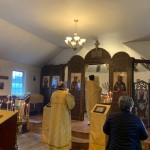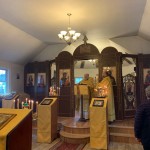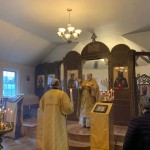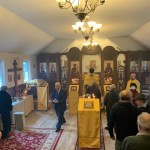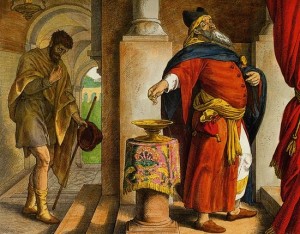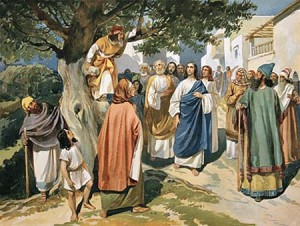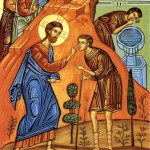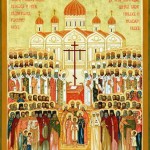The Gospel of Luke, 18, 35-43:
At that time as Jesus was coming near Jericho, that a certain blind man sat by the road begging. And hearing a multitude passing by, he asked what it meant. So they told him that Jesus of Nazareth was passing by. And he cried out, saying, “Jesus, Son of David, have mercy on me!” Then those who went before warned him that he should be quiet; but he cried out all the more, “Son of David, have mercy on me!” So Jesus stood still and commanded him to be brought to Him. And when he had come near, He asked him, saying, “What do you want Me to do for you?” He said, “Lord, that I may receive my sight.” Then Jesus said to him, “Receive your sight; your faith has made you well.” And immediately he received his sight, and followed Him, glorifying God. And all the people, when they saw it, gave praise to God.
Евангелие от Луки, 18, 35-43:
В это время, когда же подходил Он к Иерихону, один слепой сидел у дороги, прося милостыни, и, услышав, что мимо него проходит народ, спросил: что это такое? Ему сказали, что Иисус Назорей идет. Тогда он закричал: Иисус, Сын Давидов! помилуй меня. Шедшие впереди заставляли его молчать; но он еще громче кричал: Сын Давидов! помилуй меня. Иисус, остановившись, велел привести его к Себе: и, когда тот подошел к Нему, спросил его: чего ты хочешь от Меня? Он сказал: Господи! чтобы мне прозреть. Иисус сказал ему: прозри! вера твоя спасла тебя. И он тотчас прозрел и пошел за Ним, славя Бога; и весь народ, видя это, воздал хвалу Богу.
Homily of the Rector, Archpriest Igor Tarasov
Dear brothers and sisters in Christ! Today’s Gospel lesson tells us about the last miracle our Lord Jesus Christ performed before His triumphal entrance into Jerusalem where He underwent His holy Passions. This last miracle was returning the sight to a blind man in Jericho. This event is described by three holy Gospels. Holy evangelist Matthew mentions two blind men, other evangelists – only one. St. Mark tells that the blind man’s name was Bartimaeus. Thus, what is important about him?
The Holy Fathers interpret this last miracle before our Lord’s entry into Jerusalem as revealing of the coming of the time of salvation. For this reason the blind man greets Jesus as the “Lord”, the common name for God. He also calls Him “the son of David”, a title deeply rooted in the people’s expectation of the Messiah. The Jews believed that the Messiah was to be born from the heirs of King David. Another important thing is that Jesus knows beforehand what the blind man wants. But He calls him to ask freely that He might answer to that. In the same way our Lord knows beforehand what we want and what we need. But He wants us to express ourselves in prayer, so He might answer us in His mercy. It is not accidental that the Church very often uses and repeats the prayerful words of the blind man: “Have mercy!” “Lord, have mercy!” is the favorite exclamation in the prayers of the Church. The holy tradition says that this prayer was the first prayer of Adam and Eve expelled from the paradise. It is the most ancient prayer. When the Temple of Jerusalem was built the first prayer under its roof was “Lord God, hear us and have mercy!” Sometimes in our services “Lord, have mercy” is repeated 40 times, sometimes even 50 times. Our prayer has to be persistent. Somebody compared such a persistent and repetitive prayer “Lord, have mercy!” to a situation when you fell into a well and try to get out. You cry for help and you don’t stop doing so. You desperately cry for it. In this way we should pray “Lord, have mercy!” many times – asking the Lord for help and mercy.
No one should stop or prevent us from asking the Lord for His mercy. The Gospel mentions that the crowd tried to silence the blind man when he asked Jesus for mercy. The multitude warned him that he should be quiet. But he cried out all the more. In our lives many times people or circumstances attempt to silence or to prevent our prayer. Even in the Church we notice how many prayers and services are being abbreviated and simplified. Despite that influence of the world we have to continue praying, keep asking the Lord in our needs. And He will answer our prayers according to the zeal of our faith.
Today we also honor our New Martyrs and Confessors, we celebrate feast of the newly-glorified Saints of the Russian Church. All of them had to be persistent and patient in their faith. The society, the authorities attempted to silence them, to destroy Christian faith in Russia. Faithful Christians, especially the clergy, were persecuted, arrested and many of them were executed. However, the voice of the Russian Church, the voice of persistent prayer, was not completely silenced; it survived and now the Russian Church is flourishing again and honors its holy heroes of faith.
Another thing we should also keep in mind is that our prayers, as well as our hope must be specific. Again, the Lord knew what the blind man wanted from Him the most, yet He asked him, “What do you want Me to do for you?” The man could have asked, “Lord, give me the grace to live with blindness”. Some very spiritually advanced people being blind had a great grace and felt very happy without bodily vision. But the blind man in today’s Gospel asked for the sight. Faith needs to be specific, and Jesus requested to exercise a specific faith and to ask for a certain thing.
To conclude we have to understand that our merciful Lord and Savior wishes us to have a firm and persistent faith. Such a faith was found in Bartimaeus, a blind man in Jericho. His faith made him well. If we will have this kind of faith, will be enduring and persistent in our prayers, will be specific in our humble requests, the Lord may grant us what we ask for and make us joyfully follow Him.
Проповедь настоятеля, прот. Игоря Тарасова
Дорогие во Христе братия и сестры! Сегоднешнее евангельское чтение рассказывает нам о последнем чуде совершенном Господом нашим Иисусом Христом до Его торжественного входа во Иерусалим, где Он претерпел Свои святые Страсти. Этим последним чудом было возвращение зрения слепому в Иерихоне. Это событие описано в трех Евангелиях. Св. евангелист Матфей упоминает о двух слепцах, другие евангелисты – об одном. Св. Марк говорит нам, что слепого звали Вартимеем. Что же можно сказать о нем важного для нас?
Святые Отцы толкуют это чудо перед входом Господним во Иерусалим как Божие откровение о том, что время спасения наступило. Поэтому слепой приветствует Иисуса, называя Его «Господом», то есть именем свойственным Богу. Он также называет Его «Сыном Давидовым», званием, которое было глубоко укоренено в ожидании людьми Мессии. Евреи верили, что Мессия должен родиться среди потомков царя Давида. Таким образом, слепой величает Иисуса как Господа и Сына Давидового, то есть провозглашает, что Он является Мессией, Спасителем міра.
Другой важной вещью является то, что Господь наш Иисус Христос, конечно, знает чего хочет слепой. Однако Он спрашивает слепого, чтобы тот сам назвал Ему свое желание. Именно таким образом Господь всегда знает наперед чего мы хотим и в чем мы нуждаемся. Но Он желает, чтобы мы выражали свои чаяния в молитве, чтобы Он мог ответить нам Своей милостью. Это неслучайно, что Церковь часто употребляет и повторяет молитвенное слово слепого: «Помилуй!». «Господи, помилуй!» явлется самым любимым возгласом в молитвах Церкви. В некоторых местах службы оно повторяется 40 раз. Наша молитва должна быть настойчивой. Никто не должен останавливать нас или препятствовать нам в наших просьбах Господа о милости. Евангелие упоминает о том, что толпа старалась принудить слепого замолчать, когда он просил Иисуса помиловать его. Люди говорили, чтобы он молчал. Но он кричал еще громче (Лк. 18, 39). В нашей жизни также очень часто люди или обстоятельства стремятся заглушить нашу молитву или чинить ей препятствия. Даже в Церкви мы иногда видим как кто-то хочет сократить или упростить некоторые службы. Слава Богу, что это не очень удается сделать в нашей Русской Православной Церкви. Но если мы вглянем на других, инославных христиан, то увидим как много своих богослужений они сократили и упростили. Да и в некоторых иных православных юрисдикциях службы совершаются сокращенно, не так как раньше. Не взирая на это влияние міра, мы должны продолжать молиться, просить Господа в наших нуждах. И Он ответит на наши молитвы по мере нашей ревности в вере.
Сегодня мы также почитаем наших Новомучеников и Исповедников Русской Церкви, празднуем Собор этих новопрославленных наших святых. Все они были настойчивы и тверды в своей вере. Общество и власти желали их заглушить, заставить замолчать, уничтожить Церковь Русскую. Верующие люди, особенно духовенство, были гонимы: их арестовывали, многих из них казнили. Но голос Русской Церкви, голос непрестанной молитвы не был полностью заглушен и Церковь пережила все эти лихолетия. И сейчас Церковь в России возродилась и мы почитаем этих наших подвижников веры.
Кроме того нам нужно помнить, что наши молитвы, так же как и наши чаяния, наша надежда – должны быть четкими и определенными. Опять-таки вспомним, что Господь знал наперед, о чем слепой будет у Него просить, однако спросил его: «Чего ты хочешь от Меня?» (Лк. 18, 41). Слепой мог ответить: «Господи, дай мне силу, благодать жить с моей слепотой». Некоторые люди, достигшие великой духовной зрелости, могли бы так ответить. Есть примеры, когда святые подвижники или очень духовные люди, будучи слепыми, не желали прозреть, ибо чувствовали себя блаженными в этом состоянии. Рассказывают про одного слепого монаха, который был счастлив и говорил, что не хотел бы прозревать, чтобы не видеть міра с его грехами и пороками. Однако у слепого в сегоднешнем евангельском чтении было простое желание: он хотел прозреть. И он его выразил четко и определенно. Вере нужно быть четкой и определенной, и Господь желает от нас четкой веры и молитвы, прошения об определенной вещи.
Чтобы сделать заключение в нашей беседе, мы должны понять, что наш милостивый Господь желает, чтобы у нас была твердая и настойчивая вера. Такой оказалась вера Вартимея, слепого из Иерихона. Его вера спасла его (Лк. 18, 42). Она его исцелила. Если у нас будет такая же вера, если мы будем стойкими и настойчивыми в нашей молитве, если будем четко выражать то, о чем мы смиренно просим Бога, Господь подаст нам то, чего мы просим. Тогда мы, подобно слепому, который прозрел, сможем с радостью пойти вслед за Господом нашим Иисусом Христом.

